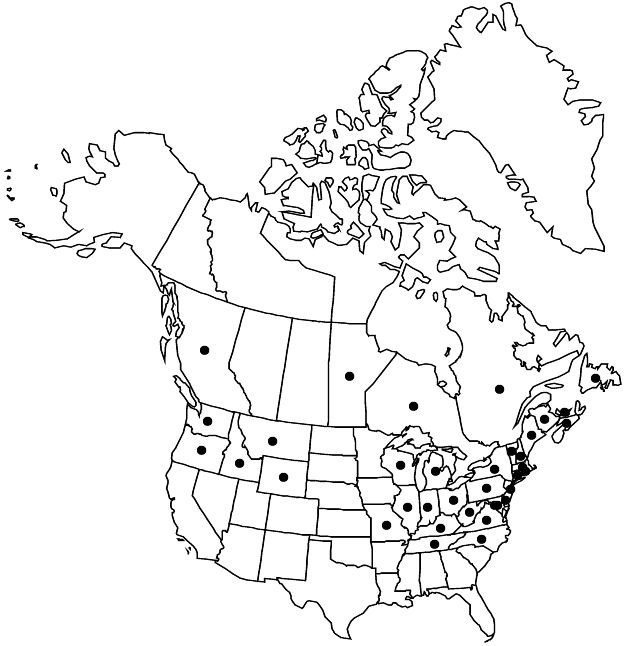Malva moschata
Sp. Pl. 2: 690. 1753.
Herbs, perennial, 0.3–1.3 m, hairs usually spreading, simple, sometimes stellate-hairy distally. Stems erect to ascending, sparsely hirsute proximally, stellate-hairy distally. Leaves: stipules persistent, linear to narrowly oblong-lanceolate, 3–8 × 2–3 mm; petioles of proximal leaf blades 3 times as long as blade, reduced to 1/2 blade length distally, mid-stem petioles 2 times as long as blade, hairs simple; distal blades usually round to reniform, deeply 5–7-lobed, lobes acutely 2-pinnatifid, 2–6 × 5–6 cm, base deeply cordate, margins irregularly toothed, apex rounded, obtuse, or acute, surfaces glabrous or sparsely hairy, hairs simple or stellate. Inflorescences axillary, flowers solitary or in fascicles, often appearing short-racemose or subumbellate terminally, long-stalked. Pedicels (0.5–)0.8–2.5 cm, to 10–35 cm in fruit, hairs simple; involucellar bractlets distinct, not adnate to calyx, linear to narrowly oblanceolate or elliptic, 5 × 1–1.5 mm, to 7–8 mm in fruit, length 1/2 calyx, margins entire, surfaces glabrous or sparsely hirsute and long-ciliate. Flowers: calyx reticulate-veined, 6–8 mm, to 15 mm in fruit, outer surface hairy, hairs both simple and stellate; petals bright pink to pale purple or white, 20–35 mm, length 2.5–3 times calyx; staminal column 7–8(–10) mm, glabrate; style 11–15-branched; stigmas 11–15. Schizocarps 9–11 mm diam.; mericarps 11–15, black, 1.5–2 mm, apical face and margins rounded, sides thin and papery, smooth, surfaces densely hirsute at least apically. Seeds 1.2–1.5 mm. 2n = 42.
Phenology: Flowering May–Oct.
Habitat: Disturbed areas, roadsides
Elevation: 0–1300 m
Distribution

Introduced; B.C., Man., N.B., Nfld. and Labr. (Nfld.), N.S., Ont., P.E.I., Que., Conn., Del., D.C., Idaho, Ill., Ind., Ky., Maine, Md., Mass., Mich., Mo., Mont., N.H., N.J., N.Y., N.C., Ohio, Oreg., Pa., R.I., Tenn., Vt., Va., Wash., W.Va., Wis., Wyo., Europe, sw Asia (Turkey), n Africa, introduced also in South America (Chile), Australia.
Discussion
Malva moschata is native from Spain to the British Isles, Poland, southern Russia, and Turkey. It has become naturalized in North America, especially in temperate northern and coastal areas. It is widely cultivated as an ornamental and frequently escapes. It occasionally hybridizes with M. sylvestris (Malva ×inodora Ponert) and M. alcea (Malva ×intermedia Boreau). It is similar to M. alcea, from which it can be distinguished by its narrower involucellar bractlets and densely hirsute mericarps.
Selected References
None.